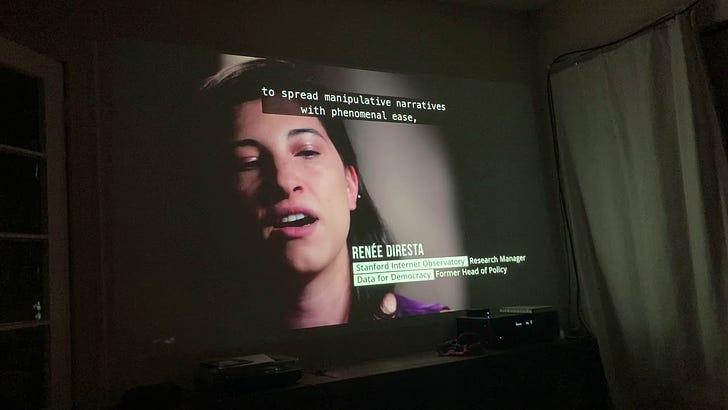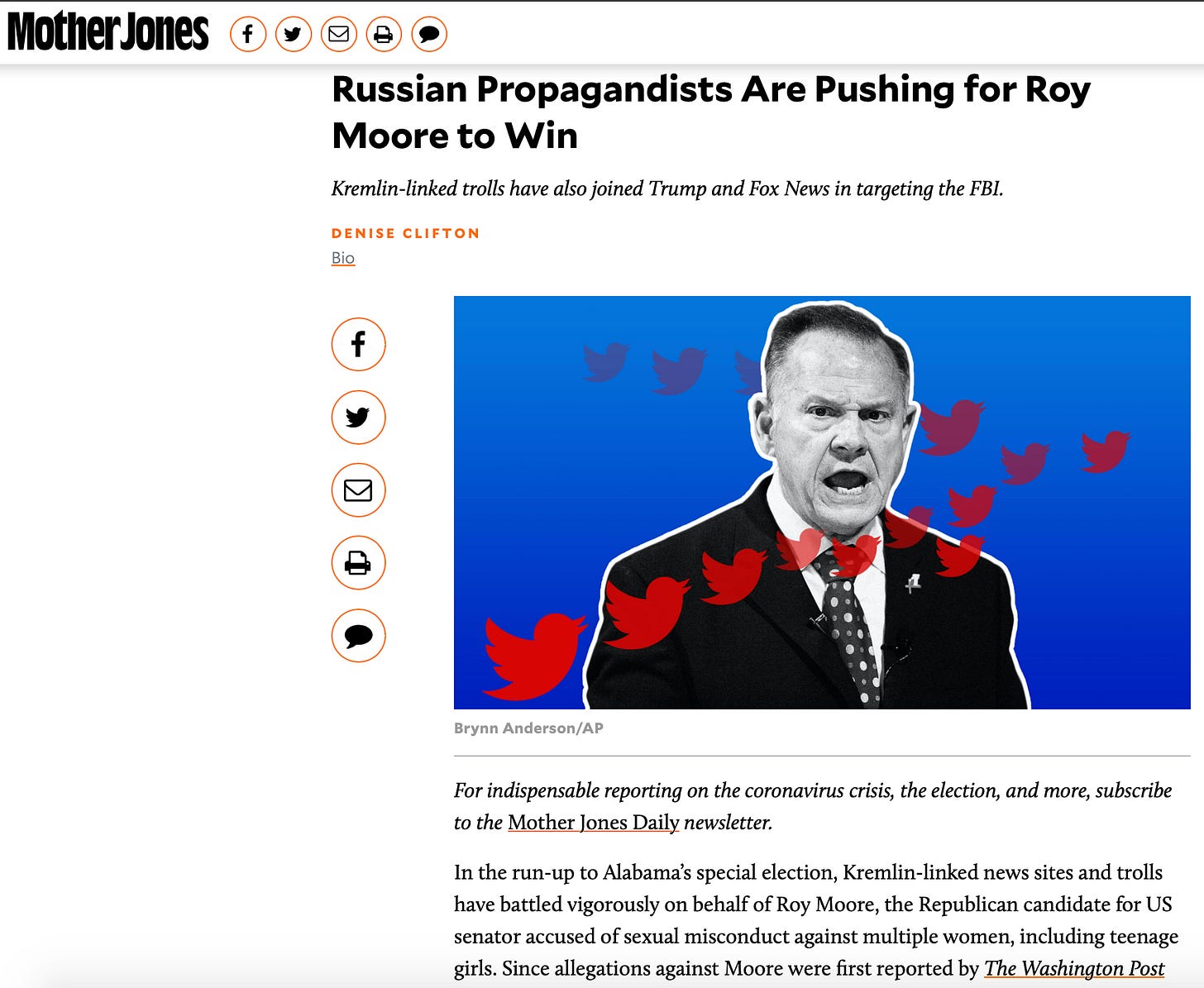The Social Dilemma? Nope. Just Silicon Valley propaganda.
The Social Dilemma is billed as an expose of Silicon Valley's manipulative social media algorithms. But it's actually a manipulative ad for a thinktank funded by toxic corporate foundations.
I was on Filmsuck to talk about the latest effort by Silicon Valley to spread fake news and brainwash people with toxic propaganda. I’m not talking about Donald Trump or the Kremlin menace that our establishment likes to hyperventilate about. I’m referring to one of the most celebrated and talked about documentaries in recent memory: The Social Dilemma.

The doc is billed as a hard-hitting expose of the dangers posed by Silicon Valley's manipulative social media business practices. But it turns out that the film is little more than a manipulative hour-and-a-half long ad for a thinktank funded by big tech and corporate foundations — including the one run by rapacious eBay oligarch Pierre Omidyar.
I’m sure Pierre — a libertarian extremist who set up a global private police force to make sure eBay’s business ran uninterrupted, wants to bring debt and corporate surveillance and manipulation into every corner of the world, no matter how remote or poor, and who helps install far-right governments in foreign countries like it’s no big thing — really wants to limit Silicon Valley surveillance power. He cares about the issue!
You should listen to the whole episode to get the full story about how unethical and propagandistic this film is — Eileen hates it with a burning passion! — but consider this short example:
About halfway through, the director interviews someone named Renée Diresta — a credentialed expert on democracy and the Internet associated with a thinktank at Stanford University.
Renée talks about the danger of fake news and the ease with which social media platforms can be used to divide people. When she came on the screen, I had to hit pause because I couldn’t stop yelling and laughing.
The fact that she is interviewed — and the fact that she is a founding advisor to the “heroic” corporate thinktank that’s at the heart of this doc — was a perfect encapsulation of everything that’s wrong with The Social Dilemma.
What Renée doesn’t mention — and what the director of the documentary omits as well — is that she used to work for an outfit called New Knowledge, a shady government and corporate cyber meddling contractor set up by a couple of guys from the NSA and the State Department. This outfit did exactly the kinds of things she’s warning people about in the documentary: it spread fake news and disinformation and ramped up radicalization and political division — and it did it all for profit.
As we found last year, in 2017 New Knowledge ran an elaborate “false flag op” on behalf of a wealthy Democratic donor — Silicon Valley tech billionaire Reid Hoffman — to influence the Alabama Senate race and to help elect a Democratic candidate. The company did this not by doing the whole Enlightenment and Liberal Values thing — like trying to appeal to voters through reason and information. Nope.
Renée’s New Knowledge did it by running an “active measures” and “maskirovka” campaign that tricked people into thinking that Roy Moore — the sleazy Republican candidate endorsed by Trump — was actually a Russian asset with connections to the Kremlin. It did this by deploying fake Facebook pages and Twitter accounts that were designed to look like they were Russian and then used them to boost Moore — all in order to make it seem like he had the Kremlin’s backing.
In short: New Knowledge spread fake news and whipped up radicalization and xenophobia to sway an election. And the campaign was wildly successful.
Mother Jones
The fake Kremlin connection that New Knowledge foisted on Moore was picked by major news outlets and became a big media scandal. Suddenly, Moore wasn’t just a creepy right-winger but an asset of Russian intelligence! It was being covered by journalists from places like Mother Jones, Bloomberg, and the New York Post so it had to be true. Ironically, even Russiagate disinfo experts who are constantly on the hunt for evil Kremlin active measures campaigns fell for this fake news op — that includes neocon activist Sarah Kendzior.
In a report that New Knowledge prepared for its billionaire client — and which was ultimately leaked to the press — the outfit bragged about how incredibly successful their operation was. With minimal resources, they were able to create a fake narrative, trick journalists into covering and spreading fake news, and ramp up political division — all with the aim of driving Democratic voter participation and dividing the Republican vote. And no one in the news caught on. They couldn’t believe how easy it was to pull off.
Here’s how the report described it (emphasis mine):
In September - December 2017 [ redacted ] ran a digital messaging operation to influence the outcome of the AL senate race. In August 2017, we developed a strategy of micro-targeting specific AL district to radicalize Democrats, suppress persuadable Republicans (“hard Rs”), and fraction moderate Republicans by advocating for write-in candidates. Our goal was to move 50,000 votes.
We targeted 650,000 likely AL voters with a combination of persona accounts, astroturfing, automated social media amplification, and targeted advertising Using these tools, we ran an aggressive campaign that contributed historically high turnout in the specific Democrat districts we targeted, a 5% drop in voter turnout compared to the [ text obscured ] Congressional race in hard R districts and drove write-in votes to a number of [ text obscured ] including one who unwittingly asked one of our conservative Facebook pages to [ text obscured ]…
Our campaign was cheap and anonymous…However, in spite of our impact inthe press and in voting outcomes, not a single story about our activities appeared in any press outlet, including far-right internet-focused conspiracy sites like InfoWars or Breitbart, prone to speculation about liberal interference in Republican politics.
Radicalizing people? Spreading fake news? Influencing opinions? Suppressing the vote? H’mmm…sounds familiar!
In The Social Dilemma, experts like Renée Diresta want people to think that the Internet’s problems are all due to manipulative social media algorithms that have been deployed by Facebook and Twitter to drive ad revenue. All that we need to do is to tweak the algos to make them more ethical. That’s it. So easy! But the fact is that it’s not just algorithms that are doing it — it’s bureaucrats like Renée and the corporate and oligarchic world that they serve.
As I’ve written elsewhere, if we’re going to talk honestly about all the manipulation that’s taking place on the Internet, we need to start with the basics: We have to remember that covert influence is not something unusual or new, but pervades every corner of our society. The use of manipulative, psychologically driven advertising and marketing techniques to sell us products, lifestyles, and ideas has been the foundation of modern American industrial capitalism, going back to the days of the self-styled inventor of public relations, Edward Bernays. It oozes out of every pore. It’s what holds our decrepit consumer society together. And when it comes to managing society, using data to influence people and shape people’s decisions has been the holy grail of the computer age, going back half a century. The Internet is just the latest manifestation of this part of our culture. In short: there is nothing wrong with the Internet. It’s working as intended. The Internet is fucked because our society is fucked.
But that’s not something that the Silicon Valley insiders, millionaires, and think-tankers who helped make The Social Dilemma are going to focus too much attention on. As far as they’re concerned, society’s been good them. What do they have to complain about?
Anyway, check out the episode — and subscribe to Filmsuck. There’s no film podcast like it out there. Eileen and Evgenia are great!
—Yasha Levine
PS: Thinking about this film, I realized that I wrote a whole draft chapter on Pierre Omidyar and his scary plans for total surveillance for my book Surveillance Valley. I ended up cutting it because it didn’t quite fit. Maybe I should clean it up and publish it.




I don't know who else has the background that you do about Internet surveillance, but it seems like a wide open lane. And your book deserves a larger audience. Don't laugh, but Joe Rogan?
Hi Yasha...given that Surveillance Valley was how I came across your work, I'd be keen to read that draft chapter if you have it sitting around...at this rate you're going to have to change your name to Morpheus ;-)